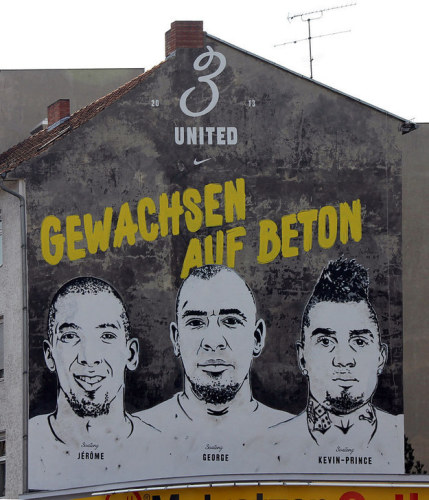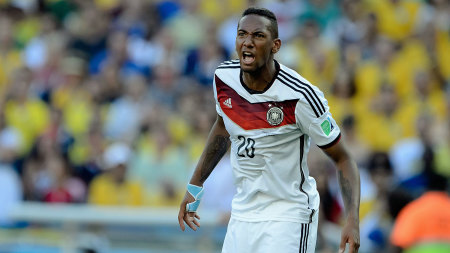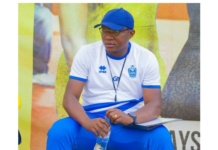Bayern Munich defender Jérôme Boateng is likely to start for Germany in Sunday’s 2014 World Cup Final against Argentina following his team’s crushing win over tournament hosts Brazil. But just who is Jérôme Boateng?
Jérôme was born in what was then West Berlin in September 1988 to a Ghanaian father and a German mother. His father, Prince Boateng, is also father to German-born Ghana international, Kevin-Prince Boateng and George Boateng, whose professional football career stalled after he spent time in jail. Prince Boateng immigrated to Berlin from Sunyani, Ghana in 1981. He married Christine Rahn, mother of George and Kevin, before leaving her for Jérôme’s mother. Jérôme made 16 appearances in the Premier League in a brief spell with Manchester City.
After beginning his professional career with Hertha Berlin, Jérôme shunned an opportunity to sign a five-year deal in favour of a move to SV Hamburg, where he played for three seasons until Manchester City came calling with a £10m plus carrot. Not helped by a knee injury he picked up on international duty in the early part of his only season in England, he struggled to maintain a first team spot in the newly enriched City team and was disappointed to be left out of the line-up for the 2011 FA Cup Final. But Bayern Munich, Germany’s blue riband club, were waiting in the wings to add the multi-purpose defender to a squad they were assembling to launch an attack on the UEFA Champions League. He was a key member of the Bayern team that lifted the Champions League trophy in 2013 following disappointment in the final the previous year when Didier Drogba’s heroics earned Chelsea the title Champions of Europe.
On the international stage, Jérôme’s move to Bayern no doubt helped him to cement his position in Germany’s back four, having had an eventful debut for the national team against Russia in 2009. As a result of two yellow cards in the game, he holds the unenviable distinction of being the only German international to be sent off on his debut.
Jérôme has been a fixture in the German back four since before their 2010 World Cup campaign that ended at the hands of eventual World Champions Spain. In South Africa 2010, Germany were drawn in the same group as Ghana, Jérôme’s father’s country of birth and a team that would feature his half-brother Kevin-Prince Boateng. Unsurprisingly, this meeting represented the first time brothers had faced each other in a World Cup game. Germany emerged victorious but Ghana also progressed to the knock-out stages courtesy of points gained against Serbia and Australia only to be cheated by a last-minute deliberate hand ball by Uruguay’s Luis Suarez and the subsequent squandered penalty.
The brothers met once again last month at Brazil 2014 and Ghana were this time able to hold Germany to a 2-2 draw. Indeed it was the Germans who were forced to hold on this time as Ghana led until a 71st minute World Cup record equalling goal from Miroslaz Klose saved the Europeans. Neither brother, however, was on the pitch for most of the dramatic second half, having both been substituted for different reasons.
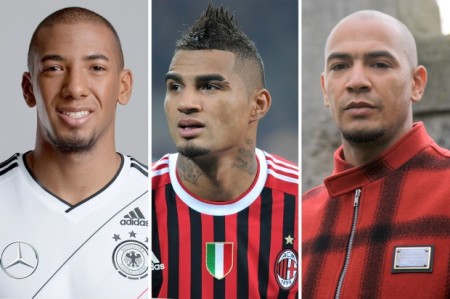
Of his decision to wait to be called up by Germany, rather than ‘defect’ to Ghana like his older brother, Jérôme states: “I never thought of playing for Ghana, it doesn’t make any sense. Germany is my home. I like the people here and the mentality.” Kevin-Prince actually did play for Germany up to U21 level, at which point he fell out with the coach over being cut from a tournament squad. Difficulty dealing with authority figures seems to be a theme running through the irascible Kevin-Prince’s career – he has again fallen out with the Ghana coach having accepted a recall to the Brazil 2014 squad after announcing his retirement from international football in 2011. Jérôme, by contrast, is calm, measured and composed, all qualities associated with the best defenders – think Bobby Moore and Franz Beckenbauer.
In the lead-up to the brothers going head-to-head for the first time at South Africa 2010, Matthias Sammer, then sports director of the German Football Association, put it this way: “A lack of discipline and egotism can be discerned in Kevin-Prince. When it comes to his athletic and mental constitution, Jérôme is the stronger player,” clearly implying one brother is a good fit for Germany, while the other is not.
Jérôme’s older half-brother (by a year and a half) visited often when they were growing up. “Kevin was Jérôme’s idol,” says Martina Boateng [Jérôme’s mother]. She rolls her eyes, as if it were something she doesn’t like to think about. “I really like Kevin. He’s funny, a clown. He loves to make people laugh. But he can’t accept a subordinate role, he has a big mouth and he doesn’t obey the rules. That always comes through.
“Kevin comes from Wedding. I admire him for having fought his way out of there. Wedding is a poor Berlin neighbourhood where foreigners make up a third of the residents. The unemployment rate is above 15 percent, 15,000 crimes are recorded every year, and the number of welfare recipients is high.”
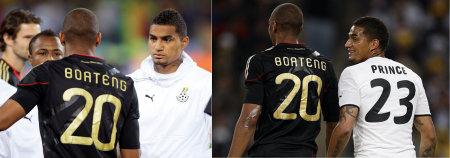
Always fearful Jérôme would fall under the influence of Kevin-Prince in a negative way, Martina explains that, for a time, Jérôme adopted a sort of affected immigrant dialect, speaking in rudimentary sentences without articles. But that was the extent of his rebelliousness. Today Jérôme is the epitome of the modern professional athlete. He doesn’t drink and he doesn’t smoke. Neither is he the party animal that his older half-brother is reputed to be.
George Boateng has this to say about his younger siblings: “I got into a lot of trouble; fights, probation. I had a short fuse and I was a bad role model for Kevin. He can thank me for his reputation.”
He prefers to talk about Jérôme, his half-brother: “Jérôme is my haven. Everyone calms down when he walks into the room. Kevin is ambitious. Jérôme is a perfectionist. He lives for success.” George is Jérôme’s harshest critic and his biggest fan. They speak on the telephone regularly, discussing the last training session and analyzing moves. “Jérôme is like a sponge. He absorbs everything.”
Jérôme Boateng will almost certainly be in Germany’s starting line-up on Sunday and will have to contend with what is, by reputation, the strongest selection of forwards in the tournament. Lionel Messi and Gonzalo Higuain, who have been starting for Argentina, haven’t lit up the scoreboards as often as Argentine fans might have liked, but Manchester City’s Sergio Agüero is clearly recovering from his injury and, judging by his performance coming off the bench in the semi-final against Holland, seems likely to play a part.
